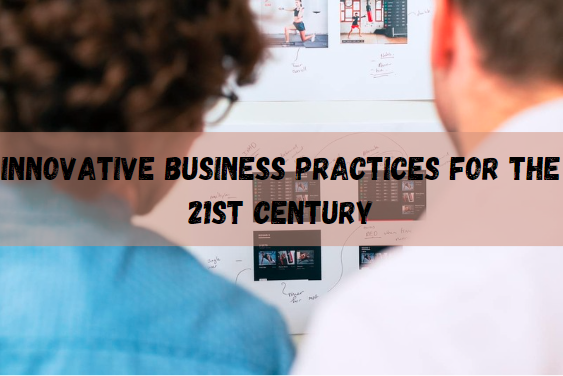The 21st century has ushered in an era of unprecedented technological advancements and rapid globalization, compelling businesses to adapt and innovate. Companies that thrive in this dynamic environment are those that embrace innovative business practices, harnessing technology and modern strategies to stay competitive. This article explores some of the most transformative business practices that define the contemporary corporate landscape.
Contents
1. Embracing Digital Transformation
Digital transformation involves the integration of digital technology into all areas of a business, fundamentally changing how operations are conducted and how value is delivered to customers. This practice is not merely about adopting new technologies but about rethinking old operating models, experimenting more, and becoming more agile in responding to customers and competitors.
Key Elements:
- Cloud Computing: Enables businesses to store and access data and applications over the internet, facilitating remote work and scalability.
- Data Analytics: Allows companies to leverage big data to gain insights into customer behavior, optimize operations, and predict market trends.
- Artificial Intelligence and Machine Learning: These technologies automate routine tasks, enhance decision-making processes, and improve customer experiences through personalization.
2. Agile Methodology
Agile methodology, originally developed for software development, has now permeated various sectors. It emphasizes iterative progress, collaboration, and flexibility, enabling businesses to respond quickly to changes and deliver value efficiently.
Key Elements:
- Scrum Framework: Organizes work into small, manageable pieces completed in short cycles called sprints, ensuring continuous improvement.
- Cross-Functional Teams: Comprise members with diverse skills who collaborate closely, fostering innovation and faster problem-solving.
- Continuous Feedback and Improvement: Encourages regular feedback from customers and stakeholders to refine products and services continuously.
3. Sustainable Practices
Sustainability has become a cornerstone of modern business strategy. Companies are increasingly recognizing the importance of environmental stewardship and social responsibility, not only for ethical reasons but also for long-term profitability and brand reputation.
Key Elements:
- Circular Economy: Focuses on minimizing waste and making the most of resources by reusing, recycling, and repurposing materials.
- Green Supply Chain: Involves sourcing raw materials and managing production processes in ways that reduce environmental impact.
- Corporate Social Responsibility (CSR): Encompasses initiatives that benefit society, such as community engagement, fair trade practices, and philanthropy.
4. Remote Work and Flexible Work Arrangements
The COVID-19 pandemic accelerated the adoption of remote work, which has now become a permanent fixture for many businesses. Offering flexible work arrangements can enhance employee satisfaction, reduce overhead costs, and attract a broader talent pool.
Key Elements:
- Telecommuting: Allows employees to work from anywhere, leveraging digital tools and communication platforms to stay connected.
- Flexible Schedules: Enable employees to choose their working hours, promoting work-life balance and increasing productivity.
- Virtual Collaboration Tools: Platforms like Slack, Microsoft Teams, and Zoom facilitate seamless communication and collaboration among remote teams.
5. Customer-Centric Strategies
In the 21st century, businesses are increasingly focusing on delivering exceptional customer experiences. A customer-centric approach involves understanding and anticipating customer needs and creating personalized experiences that foster loyalty and satisfaction.
Key Elements:
- Customer Journey Mapping: Visualizes the end-to-end experience customers have with a company, identifying pain points and opportunities for improvement.
- Personalization: Uses data analytics and AI to tailor products, services, and communications to individual customer preferences.
- Customer Feedback Loops: Actively seek and act upon customer feedback to enhance products and services continually.
6. Innovation and R&D Investment
Investing in research and development (R&D) is critical for businesses aiming to innovate and stay ahead of the competition. Continuous innovation drives product development, improves processes, and creates new market opportunities.
Key Elements:
- Open Innovation: Involves collaborating with external partners, such as universities, research institutions, and startups, to co-develop new technologies and solutions.
- Intrapreneurship Programs: Encourage employees to develop and pitch their ideas for new products or improvements, fostering a culture of innovation.
- Prototyping and Testing: Rapidly develop and test prototypes to gather feedback and refine ideas before full-scale production.
7. Ethical Business Practices
Ethical business practices are essential for building trust with customers, employees, and stakeholders. Companies that prioritize ethics and integrity are more likely to enjoy long-term success and positive brand reputation.
Key Elements:
- Transparent Communication: Maintain openness and honesty in all interactions, ensuring stakeholders are well-informed about company operations and decisions.
- Fair Labor Practices: Ensure fair wages, safe working conditions, and respect for workers’ rights throughout the supply chain.
- Anti-Corruption Measures: Implement policies and procedures to prevent bribery, fraud, and other unethical behaviors.
8. Leveraging Social Media and Digital Marketing
Social media and digital marketing are powerful tools for reaching and engaging with customers in the 21st century. Businesses can use these platforms to build brand awareness, drive sales, and foster community engagement.
Key Elements:
- Content Marketing: Create and distribute valuable, relevant, and consistent content to attract and retain a clearly defined audience.
- Influencer Partnerships: Collaborate with influencers to promote products and services to their followers, leveraging their credibility and reach.
- Social Media Analytics: Use data from social media platforms to measure campaign effectiveness, understand customer preferences, and inform marketing strategies.
Conclusion
Innovative business practices are essential for navigating the complexities of the 21st-century marketplace.
By embracing digital transformation, adopting agile methodologies, committing to sustainability, offering flexible work arrangements, prioritizing customer-centric strategies, investing in R&D, maintaining ethical standards, and leveraging digital marketing, companies can position themselves for long-term success.
These practices not only enhance operational efficiency and profitability but also contribute to a positive societal impact and a sustainable future.
























+ There are no comments
Add yours